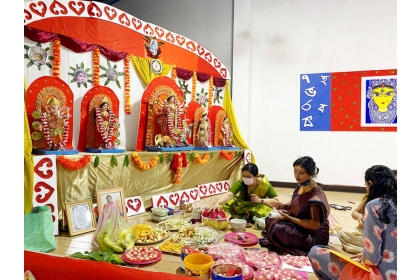【學者評論】The ‘avenger of evil’ in Taiwan The yearly Durga Puja held by the Indian community in Taiwan demonstrates the deepening cultural ties between the two nations
更新時間:2022-10-19 09:16:57 /
張貼時間:2022-10-19 09:16:09
興新聞張貼者
單位秘書室
新聞來源Taipei Times
1,535
Source:2022-10-18/Taipei Times/Contributing Writer /Rup Narayan Das (Rup Narayan Das is a Taiwan Fellow at National Chung-Hsing University and author of the book ‘Hong Kong Conundrum: Pangs of Transition.’)
The celebration of Durga Puja in the New Taipei City Library in Sijhih District (汐止) early this month shows once again the deepening cultural and educational ties between Taiwan and India.
Illustrating the deepening ties, Sujeet Kumar, an Indian member of parliament and Taiwan enthusiast, also attended the festival, which had extra significance due to it being recognized for its cultural value by the UN.
UNESCO this year inscribed Durga Puja on its Representative List of Intangible Cultural Heritage of Humanity and lauded the festival “as the best instance of public performance of religion and art... During the event, the divides of class, religion and ethnicity collapse as crowds of spectators walk around to admire the installations.”
Durga is an important Hindu goddess and is worshiped as the symbol of the triumph of good over evil. The goddess, riding a tiger or lion, is associated with the protection of her children and fights demons and destructive forces.
The resolve and infinite energy of Durga is a persona that some in the Indian community feel President Tsai Ing-wen (蔡英文) embodies, as she remains calm in the face of the saber-rattling behemoth across the Taiwan Strait.
Although the festival is celebrated every year in October, primarily by the Bengali community, of late it has acquired a pan-India character and as such it is now celebrated in Indian communities across the globe.
The 10-day festival begins with Mahalaya, when the chanting of hymns consecrated to Durga permeates the ambiance in crescendo with the beating of the drums and the blowing of conks.
Due to Taiwan’s religious diversity and tolerance, the Indian community, estimated to be over 5,000, has started celebrating festivals like Durga Puja and Dewali (the festival of light) with gusto, receiving the wholehearted support and cooperation of locals and civic authorities in terms of finding proper venues.
It augurs well that, although India and Taiwan may not share formal diplomatic relations, the extent to which the two have moved closer culturally and educationally in recent years could not have been imagined decades earlier.
The relationship between civil society and coverage in the media both in India and Taiwan also raised awareness among the people and empathy for each other has grown phenomenally.
The celebration of Durga Puja in the New Taipei City Library in Sijhih District (汐止) early this month shows once again the deepening cultural and educational ties between Taiwan and India.
Illustrating the deepening ties, Sujeet Kumar, an Indian member of parliament and Taiwan enthusiast, also attended the festival, which had extra significance due to it being recognized for its cultural value by the UN.
UNESCO this year inscribed Durga Puja on its Representative List of Intangible Cultural Heritage of Humanity and lauded the festival “as the best instance of public performance of religion and art... During the event, the divides of class, religion and ethnicity collapse as crowds of spectators walk around to admire the installations.”
Durga is an important Hindu goddess and is worshiped as the symbol of the triumph of good over evil. The goddess, riding a tiger or lion, is associated with the protection of her children and fights demons and destructive forces.
The resolve and infinite energy of Durga is a persona that some in the Indian community feel President Tsai Ing-wen (蔡英文) embodies, as she remains calm in the face of the saber-rattling behemoth across the Taiwan Strait.
Although the festival is celebrated every year in October, primarily by the Bengali community, of late it has acquired a pan-India character and as such it is now celebrated in Indian communities across the globe.
The 10-day festival begins with Mahalaya, when the chanting of hymns consecrated to Durga permeates the ambiance in crescendo with the beating of the drums and the blowing of conks.
Due to Taiwan’s religious diversity and tolerance, the Indian community, estimated to be over 5,000, has started celebrating festivals like Durga Puja and Dewali (the festival of light) with gusto, receiving the wholehearted support and cooperation of locals and civic authorities in terms of finding proper venues.
It augurs well that, although India and Taiwan may not share formal diplomatic relations, the extent to which the two have moved closer culturally and educationally in recent years could not have been imagined decades earlier.
The relationship between civil society and coverage in the media both in India and Taiwan also raised awareness among the people and empathy for each other has grown phenomenally.


